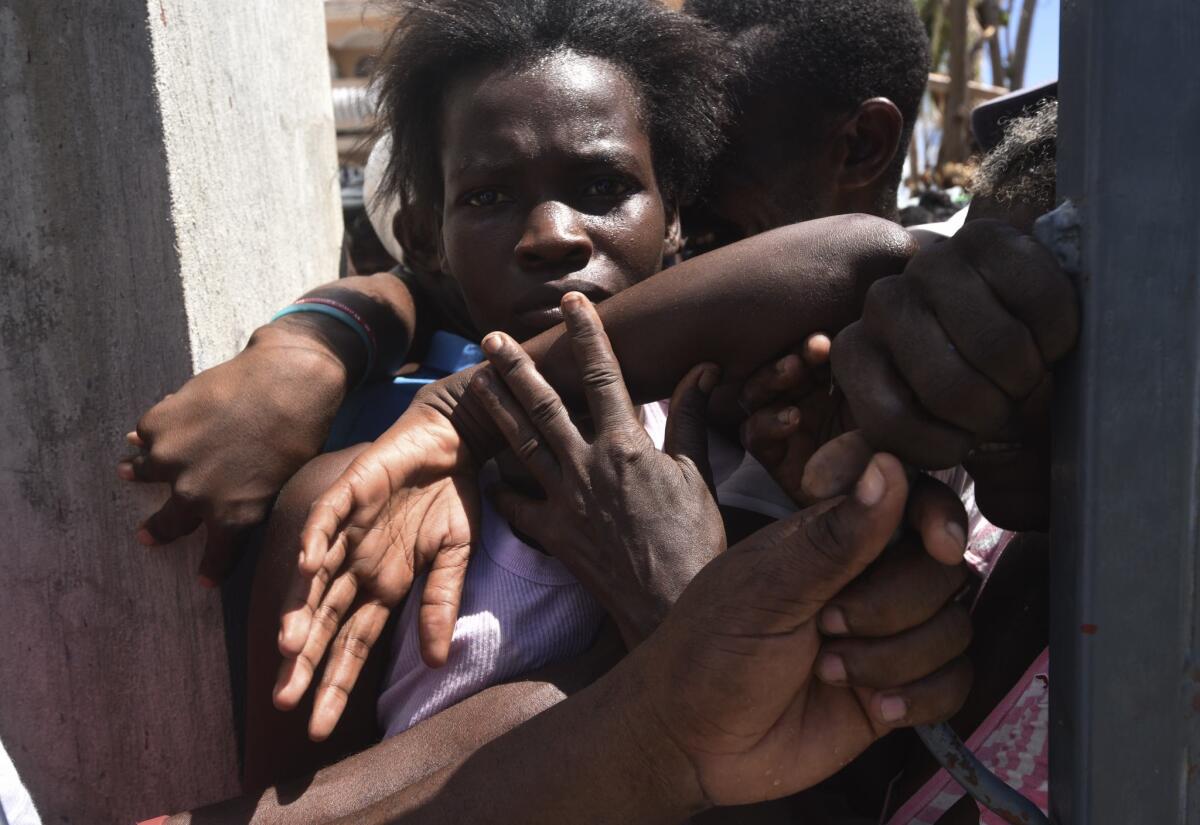Q&A:: ‘Getting it right is absolutely fundamental,’ U.S. official says of aid to Haiti

- Share via
Reporting from Mexico City — With more than 1,000 deaths in hurricane-ravaged Haiti and the growing threat of a cholera epidemic, the United States Agency for International Development announced Thursday that it was sending an additional $12 million in assistance.
We talked with David Harden, an assistant administrator with the agency, about the scope of damage in Haiti, the distrust around aid work there, and the long road ahead.
Your agency is announcing another $12 million in aid to help communities affected by Hurricane Matthew, primarily in Haiti. Why?
Because there are vulnerable people who have great need. And because we are good neighbors.
There are 1.5 million people in need in Haiti right now. Of the $12 million we’re sending, $7 million is for food, which will help provide food for 750,000 people for three months. Another $3 million is for relief supplies — blankets, hygiene care, water containers and electric generators. And $2 million is going to logistics, to help us get to these hard-to-reach areas.
What are your biggest concerns at this point?
First, the hard-to-reach areas are really hard to reach, and we need to access them, provide relief and get an ongoing assessment of what their needs are and what the response should be. We’ve sent 13 helicopters, which are helping.
The second concern is cholera and preventing its spread. Right now we’re airlifting in water purification tablets for 475,000 people. We’re bringing in 38 metric tons of chlorine to clean the piped water, particularly in the high-risk areas.
We’re working with the Haitian authorities, the United Nations and the U.S. military to airlift in [special cholera treatment equipment] . And we’re continuing our partnership with the Centers for Disease Control and Prevention and the government of Haiti to make sure that there’s capacity to monitor and treat water-borne illness and to conduct the necessary water testing.
Cholera, and aid work in general, is a touchy subject in Haiti, after the disease was inadvertently brought to Haiti by Nepalese United Nations peacekeepers in the wake of 2010’s devastating earthquake. Has that complicated history made things harder for you? Is there distrust of aid workers, or are people just happy for the help?
I can’t really address the local response. We’re trying to save lives and alleviate human suffering, and what we mainly do is respond to the most vulnerable people. These are the people most in distress.
We understand that cholera is a complicated issue and a delicate and difficult health problem. Our [staff] has worked in close partnership with the government of Haiti, and we have specific expertise to look at water sanitation and health.
There have been many questions about what happened to the nearly $10 billion in aid that was raised after the 2010 earthquake, and whether it reached the people it was meant to help. The Rev. Al Sharpton recently said he won’t donate to hurricane relief until he finds out what happened to the earthquake aid. Is that complicating the relief effort this time around?
Look, the past is disassociated from our immediate needs for relief and response. We have a problem in front of us, and we are responding. Today’s announcement of new aid is an example of that. Our assistance right now is mostly actual relief supplies that are going to nonprofits that are on the ground. And we monitor their distribution and use.
We do want to make sure that our money is used with integrity. That is a highly important matter, including for me personally. I’ve done this work for 20 years, and getting it right is absolutely fundamental.
Do you think there are enough safeguards in place to make sure that the nongovernmental outreach agencies are actually doing the work and doing it well?
I do. These are, generally speaking, U.S. nonprofits. And we know them, we vet them, we audit them and we partner with them. We have a long-term relationship, so they have an inherent interest in getting it right.
The storm caused long-delayed presidential elections in Haiti to be postponed again. Is that concerning?
It’s understandable right now, given the massive nature of the hurricane, with roads and systems down, that there was a delay. We do want them to have elections. But right now we are singularly focused on saving lives.
So the plan is to get Haiti up and functioning so they can proceed with the elections?
Yes.
You have a better sense than most about the scale of devastation in Haiti. How much more help is needed? Should regular people be giving, should other countries be stepping up?
We are only at the early stages of relief. We’re going to be in relief for a little bit longer, and then we’ll begin to have conversations about what recovery looks like, and then what longer-term reconstruction looks like.
Envision your house. A tree falls down on your roof. What do you? First you cut down the tree – that’s what we’re doing right now.
Getting your house fully operational, that’s a longer-term process. It’s a little more complicated, involving logistics and engineering and money. So those things by nature are long-term and more costly and more complicated. Right now, we’re just repairing your house and making sure your kids are safe.
Twitter: @katelinthicum
ALSO
How much more must Haiti endure?
Where Hurricane Matthew hit hardest: Hundreds dead in ravaged Haiti
Haiti’s troubled succession of leaders: ‘They don’t really want to work for the Haitian people’
More to Read
Sign up for Essential California
The most important California stories and recommendations in your inbox every morning.
You may occasionally receive promotional content from the Los Angeles Times.











